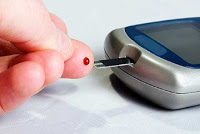Erectile dysfunction (ED) is 3.5 times more common in men with type 2 diabetes than those without diabetes. It happens 10-15 years earlier in men with diabetes, and is often more severe. The likelihood and severity of ED is higher with longer duration of diabetes, poor diabetes control, and presence of diabetes complications. The prevalence of ED is also higher in people with type 2 diabetes who also have obesity, and 90% of people with type 2 diabetes have overweight or obesity.
Diabetes can lead to ED for many reasons. For example, higher sugars over time can lead to damage to the blood vessels in/to the penis, and can also lead to nerve damage. Obesity commonly leads to lower testosterone production, which can contribute to ED.
The question has been asked whether diabetes medication could improve or prevent ED in people with type 2 diabetes. The class of medications known as GLP1 receptor agonists (GLP1RAs) seem a potential candidate, not only because they improve blood sugars, blood pressure, and help with weight loss, but also because the GLP1RAs are believed to have beneficial effects directly on blood vessels (antiatherosclerotic effects, including reduction in oxidative stress and endothelial function). Studies in animals have even shown benefits to blood vessels in the penis, and an antiinflammatory effect in testicles.
The REWIND trial, as blogged previously, was a cardiovascular outcome trial of the GLP1RA dulaglutide (Trulicity). This study showed that dulaglutide reduced the risk of cardiovascular events (particularly stroke), kidney disease, and cognitive decline in people with type 2 diabetes, over an average follow up time of 5.4 years. A recent analysis looked at the data from the REWIND trial, to evaluate the effect of dulaglutide on ED. These data from the REWIND trial represent the first randomized data ever to assess the effect of a diabetes medication on ED.
Men in the REWIND study were invited to complete an ED questionnaire at baseline, 2 years, 5 years, and study end. The primary ED outcome was the first occurrence of moderate or severe erectile dysfunction. Amongst the 3725 men who were included in this analysis (70% of men in the REWIND Trial), 40% had a history of cardiovascular disease, and 57% had moderate or severe ED at the start of the study. The average age of these men was 66, average BMI was 31.6, A1C was 7.3%, and average duration of diabetes was 10.6 years. Only 5% of these men were on treatment for ED, suggesting that few had actually been diagnosed and treated for ED.
After randomization, moderate to severe ED was reported by 73.8% of men in the dulaglutide group, vs 75.7% of men in the placebo group, with the crude incidence of ED in the dulaglutide group being 21.3 per 100 person-years, vs 22 per 100 person-years in placebo. In other words, there was an 8% lower risk of reporting moderate to severe ED in the dulaglutide treatment group. This benefit was primarily enjoyed by men with prior cardiovascular disease, in whom there was a 19% lower risk of moderate/severe ED. Looking only at men who had ED at the start of the study, there remained a lower incidence of ED with dulaglutide vs placebo. However, when the authors looked at sustained ED (rather than first occurrence), differences between dulaglutide vs placebo groups were not seen. Although there was no improvement in erectile function with dulaglutide, men in the dulaglutide group had a lesser fall in erectile function than men in the placebo group.
BOTTOM LINE: In this study, treatment with dulaglutide reduced the incidence of ED, particularly in men with existing cardiovascular disease. While the magnitude of benefit is perhaps not awe-inspiring, any benefit helps. What IS awe-inspiring is the capacity of dulaglutide (and other GLP1RAs, as blogged previously here and here and here) to reduce the risk of cardiovascular events (including heart attacks and strokes, and in some studies, death), as well as benefits to protect kidneys. Based on this study, we can perhaps add ED to the list of health benefits of GLP1RA treatment.
Disclaimer: I was involved as an investigator in the REWIND trial. I receive honoraria as a continuing medical education speaker and consultant from the makers of dulaglutide (Eli Lilly).
Share this blog post using your favorite social media link below!
Follow me on twitter! @drsuepedersen
www.drsue.ca © 2021












